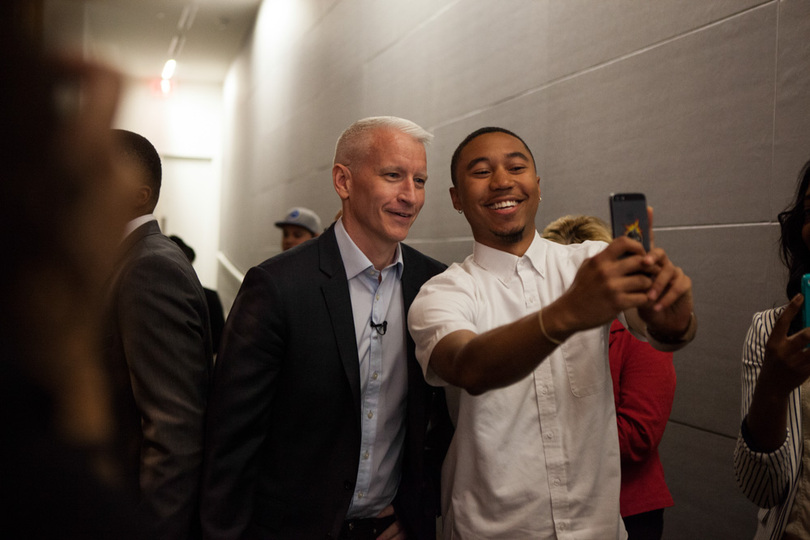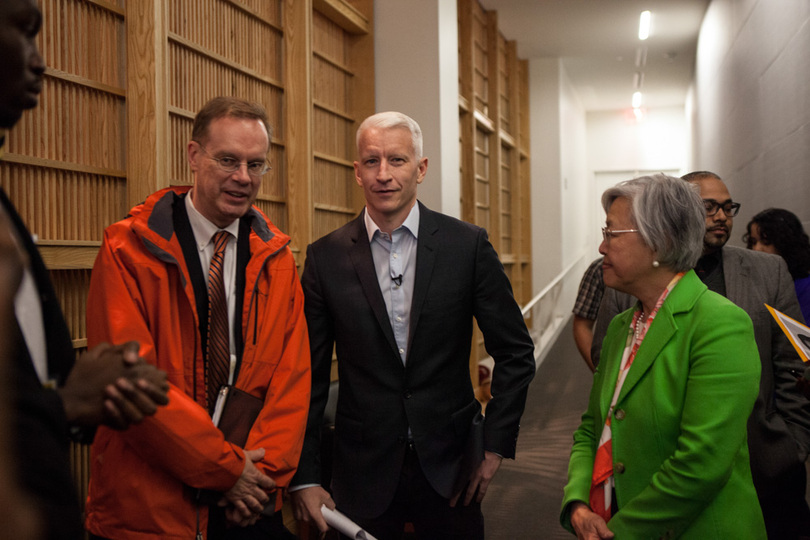CNN anchor Anderson Cooper discusses early experiences in journalism, diversity in media
CNN anchor Anderson Cooper’s first time on the job as a war correspondent almost didn’t happen, so he had to get crafty – he created a fake press pass to cover the conflict in Burma.
“If no one was going to give me an opportunity, I made one,” Cooper said.
Cooper spoke of his time before he became a high-profile journalist during a sold-out question and answer session in the Joyce Hergenhan Auditorium Thursday night. He answered questions about his experiences covering war zones, his childhood and diversity in the media. It was part of the annual Truth Be Told speaker series hosted by the Alpha Phi Alpha fraternity and Syracuse University’s chapter of the National Association of Black Journalists.
Even though Cooper’s struggles to kick start his career were long ago, Chelsea D’Amore, a senior public relations and political science major, said she appreciated his remarks about his initial difficulties to find a job straight out of college.
“I’m a senior this year, so his introduction talking about not knowing what to do when you graduate and picking a path and going to it was definitely ringing true with me,” D’Amore said.
After creating a fake press pass to report on Burma, Cooper said he found an opportunity to travel to Somalia during a major famine. There, he said, he found his calling from the “extraordinary and eye-opening experience.”
Though he received a degree from Yale University, Cooper said he felt like he was educated in Somalia. He added that covering the stories people were running from helped him cope with personal events such as his brother’s suicide.
“I wanted to go places where the pain outside matched the pain I felt inside,” Cooper said. “You expect to find horror, but you find humanity as well.”
Carly Signor, a senior broadcast and digital journalism major, said she enjoyed hearing Cooper’s passion about covering wars in other countries.
“Covering wars, like he has, is a very difficult thing to do,” she said. “You see a lot of death and pain, so learning that you can take that and other people need to see that in journalism is really important.”
Cooper also spoke about how his sexuality has affected his career. He said he told his family and friends that he was gay for the first time his senior year of high school.
Originally, Cooper did not want to speak about his sexuality on the job, because he did not want it to interfere with his journalism career. But as his sexuality grew public, he said he was concerned that it might seem as if he was ashamed of his sexuality.
So in 2012, Cooper announced publically that he is gay.
“I love being gay, I wouldn’t change it for the world. Not that you can change it,” Cooper said, igniting cheers and laughter from the crowd.
Through his 20 years in journalism, Cooper said he’s noticed an improvement in diversity in the newsroom. However, he said there is still more to be done.
Everyone benefits when the television accurately reflects a society, Cooper said, adding that he always thinks about creating a diverse environment in his newsroom.
More organizations from the top down need to constantly think about diversity because it will only make them stronger, he said.
Said Cooper: “If you don’t have people of color or openly gay and lesbian reporters, then those stories don’t get told.”
Published on April 25, 2014 at 1:45 am
Contact Anna: almerod@syr.edu










